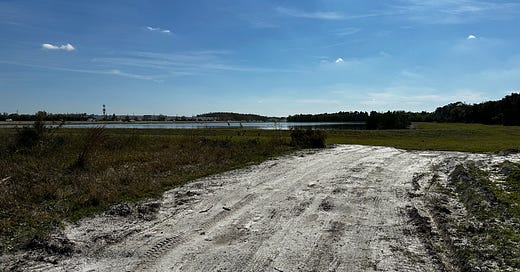My fishing buddy and I have a different perspective on this question. He believes if there is access to water and it looks fishy, you should throw a line. On the other hand, I always check to see if it is posted, and if you have to cross private property to reach the water, I try to find the owner and get permission. My buddy claims that my approach means I miss some prime fishing. I know he is right about that, but I struggle to throw caution to the wind and fish simply.
I used the AI tool Grok to get a better handle on the Pros and Cons. Here is what it came up with:
Asking for Permission:
Pros:
Legal Compliance: Asking for permission ensures you're fishing legally on private property or in regulated areas, which can avoid fines or legal action.
Respect for Property: It shows respect for landowners or specific areas managed for conservation, potentially leading to better relationships or access for future visits.
Safety: In some cases, you might get advice on where it's safe to fish, avoiding areas with hazards like strong currents or wildlife.
Cons:
Time-Consuming: Securing permission can take time, especially if you need to contact multiple landowners or navigate through bureaucratic processes for public lands.
Access Denied: There's a chance you could be denied access, limiting your fishing spots.
Less Spontaneity: Planning ahead might reduce the spontaneity of deciding to go fishing on a whim.
Asking for Forgiveness:
Pros:
Immediate Action: You can start fishing immediately without the delay of seeking permission, which can be appealing if you're short on time or want to take advantage of good weather conditions.
Discovering New Spots: Sometimes, you might find great fishing spots that aren't commonly used, enhancing your fishing experience.
Cons:
Legal Risks: Fishing without permission can lead to legal consequences, including fines, trespassing charges, or even arrest in extreme cases.
Ethical Concerns: It can be seen as disrespectful or irresponsible, damaging relationships with landowners or local communities.
Reputation: If caught, your reputation among local fishers or in the community might suffer, potentially limiting future access to fishing spots.
I will admit the Cons I found didn’t seem overly persuasive. I was hoping the decision would be black and white. The legal implications are, of course, scary if taken at face value. But, as my buddy often points out, if somebody objects to your fishing, don’t argue; simply pack up your gear and move on. Unless the location is clearly marked with No-Trespassing signs, the likely worst-case scenario is you apologize and pack up.
This question is particularly relevant today. Road construction is underway along Route 75 in Fort Myers, Florida. They are building a road alongside the highway. The clear-cutting has opened easy access to a large pond previously on gated private property. I drove over to the area on a scouting mission and saw no signage that would prevent anyone from fishing the pond. I also didn’t see anyone fishing. But that doesn't mean there aren’t big bass waiting to be caught.
I ran into this dilemma before, and it didn’t turn out as I had hoped. As background, there is a bend where Glendale-Milford Road crosses the Little Miami River. That bend has a set of exceptionally sweet riffles. One of my favorite things is to float a hopper down riffles and let smallmouth bass hit it. The thrill of a “small” nailing a topwater hopper is almost as good as the thrill of a trout doing it.
The easiest and safest access to those riffles is the Livingston Lodge property in Indian Hill on North Given Road.
One day, I stopped in and asked the Lodge caretaker if I could walk across the lawn to enter the river. Because I don't live in Indian Hill, he declined permission. Of course, I didn't like the answer then, and I still don't today. I have seen other fly fishermen fish that stretch of water. I can’t help wondering if I had not stopped to ask for permission, would the caretaker have stopped me, or would I have had an amazing day fishing instead? I know my buddy would have simply walked across the lawn without a care.
One of my personal flaws is that I tend to overthink matters, so in addition to the Pros/Cons list, I decided to get an additional perspective on fishing ethics without permission. I found that fishing without permission is generally considered ethically questionable because it can disrespect property rights, ignore legal frameworks designed for conservation and fairness, and potentially harm ecosystems. Ethical fishing would typically involve securing permission, understanding and adhering to local regulations, and considering the broader impacts of one's actions on human and natural environments. If permission is not granted, the appropriate ethical response might involve finding alternative, legal fishing spots that are accessible.
The Angel on my right shoulder is leveraging my overdeveloped sense of ethics and whispering in my ear, “Ask permission.” The Devil on my left shoulder is telling me to go for it. Remarkably, he looks like the spitting image of my buddy. If I listen to the Angel, I will likely miss some amazing fishing water. If I listen to the Devil, I might catch the bass of a lifetime.
I am still deciding whether to fish this pond. I could use your help. Should I listen to the Angel or the Devil? I’d call my buddy, but I know what he would say. Leave me a comment and give me your advice on this common problem we face fishing in unknown waters.





I always research the local laws prior to attempting or requesting access. The additional knowledge provides me with a bit more comfort in my approach. A fear of rejection usually results in me not asking and not going.
I have been waiting for your next writing. ☺️